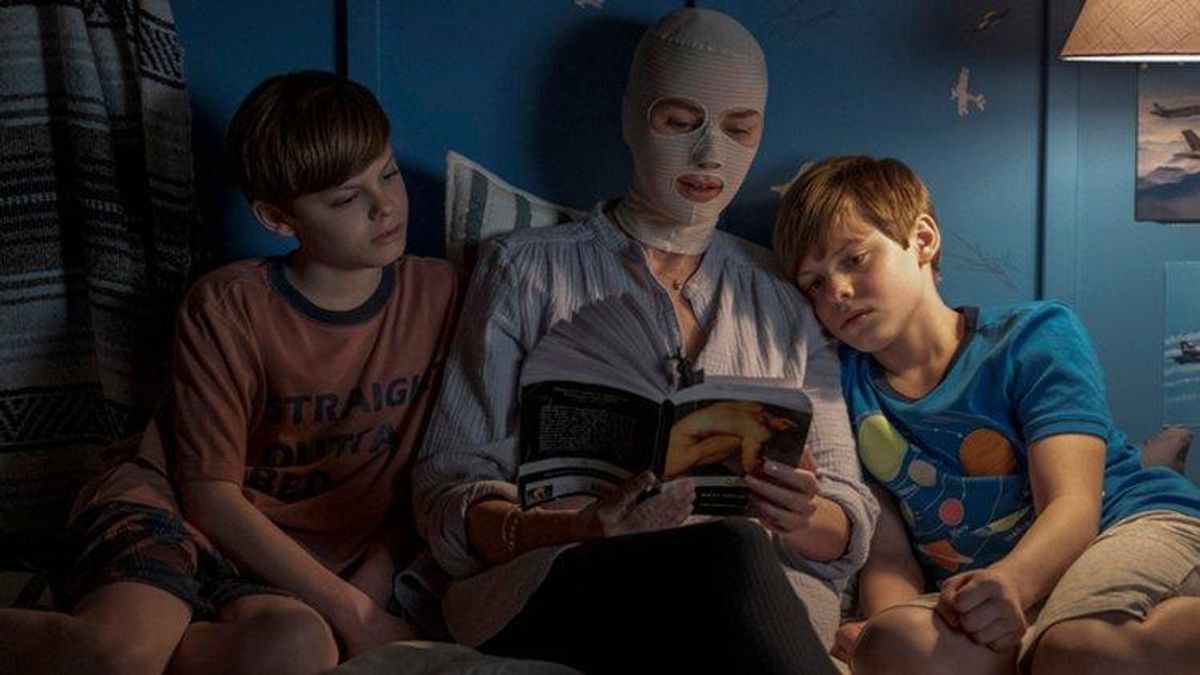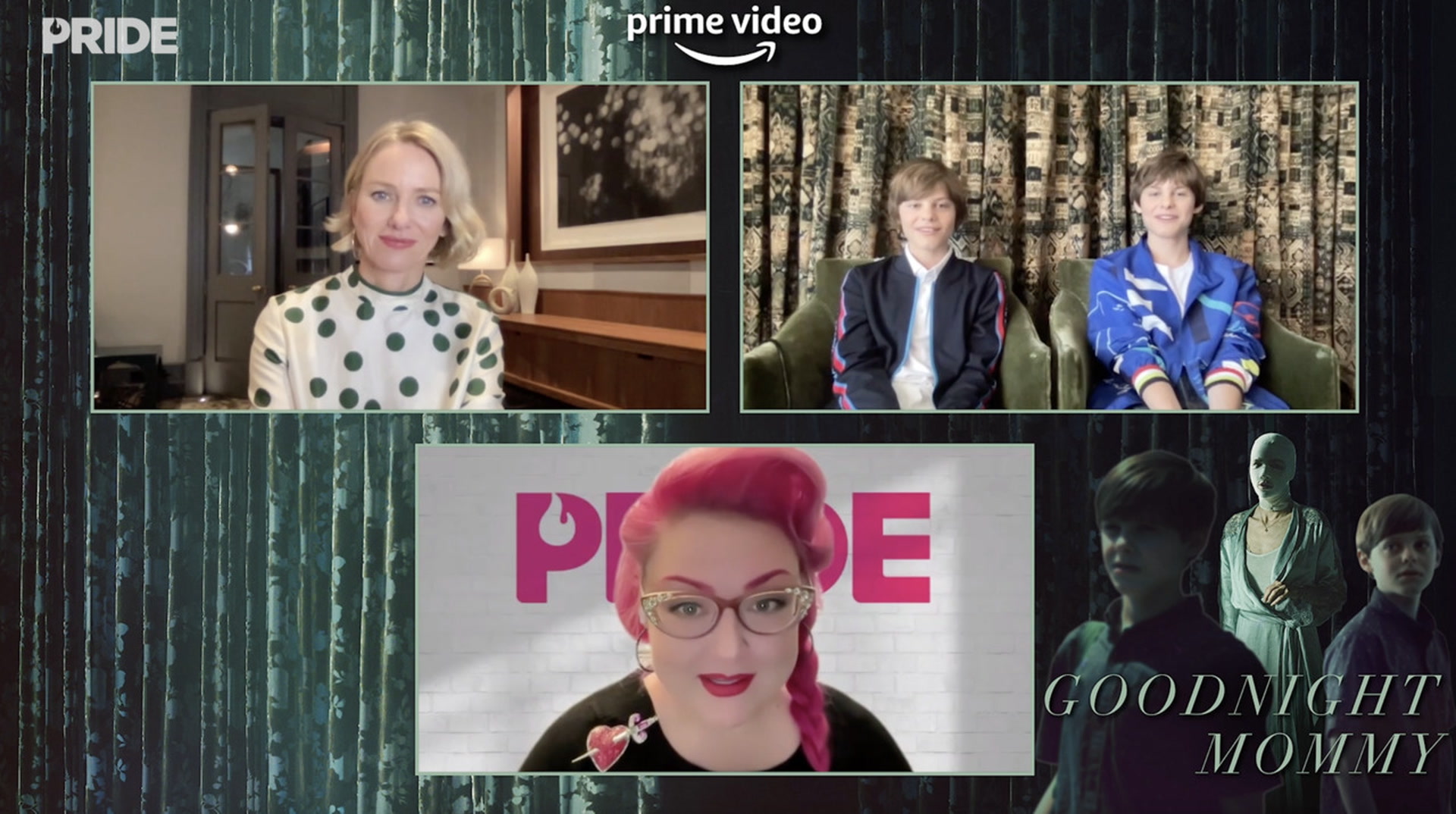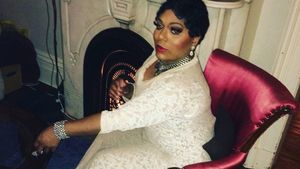Throughout cinema history, otherness has frequently been a way to wink and nudge at queerness and is used as code for villainy. But as subtextual queers came out of their celluloid closets, this trope has become less of a shorthand. Otherness, however, remains a ripe source of terror to be mined, and Goodnight Mommy makes excellent use of this primal fear.
The film follows a mother (Naomi Watts) and her twin sons Elias and Lucas (Cameron Crovetti and Nicholas Crovetti) whose relationship quickly devolves when the boys return home to find her face wrapped in gauze. Through a sequence of events, they begin to suspect that she is no longer the woman they once called mother.
She begins laying out strange rules, she’s short with them, she drinks and smokes, and, worst of all, she won’t sing to them and tuck them into bed as she’s always done before. Slowly their suspicion grows that a stranger has taken her place; an “other” means to do them harm, one they must protect themselves from — at any cost.
 Watts gives a raw and ferocious performance, vacillating from a brittle desire to connect with her children and enraged at their inevitable misbehavior. Her motivations are just muddy enough to make the twins’ paranoia contagious. It’s a particularly impressive performance on Watts’ behalf, as through 90 percent of the film’s runtime her face is obscured with medical bandages.
Watts gives a raw and ferocious performance, vacillating from a brittle desire to connect with her children and enraged at their inevitable misbehavior. Her motivations are just muddy enough to make the twins’ paranoia contagious. It’s a particularly impressive performance on Watts’ behalf, as through 90 percent of the film’s runtime her face is obscured with medical bandages.
It was a challenge she was excited to take on. “I was definitely both haunted by that notion of losing the capacity to have your whole face express whatever emotions that woman is going through, but I was also intrigued by the challenge,” Watts tells PRIDE. “And to be truthful, when you have extraordinary limitations, you find ways to use whatever else you can access, and that can be quite freeing when there’s really hardcore, steadfast rules.”
“Obviously, I knew that my eyes were going to be the most powerful tool, but that’s in a close-up. So what are you going to do with the rest of your body? You have to be very still,” Watts explains. “But then with a wide shot, you use your body, and your physicality is the most powerful tool, and you just kind of learn it as you go. And I did recall my learnings from back in acting class many, many years ago, where you learn all about how to work with a mask.”
It’s a clever metaphor for a film that’s ultimately about unreliable narrators, both of the external and internal variety, because while her eyes may be visible, all her microexpressions remain obscured, so on an innate level she becomes an untrustworthy... other.
While queer-coded characters’ “unnatural” have long been seen as proof of their wickedness, in the case of Watts’ mother the character’s evidence of evil often lies in the systemic expectations of women. In this case, of being both a perfect mother and perfect in appearance. Her pursuit of the latter is strike one and her failure at the former is confirmation of villainy to her children.
 “I thought it was really interesting about her. She’s at this point in her life where she’s battling with demons and she’s feeling quite lonely. The kids have not been with her for a portion of time. How will she be in this moment after not seeing them, and then she’s had this face work done. So she’s got a lot going on,” Watts says about where her character’s at when we meet her in the film.
“I thought it was really interesting about her. She’s at this point in her life where she’s battling with demons and she’s feeling quite lonely. The kids have not been with her for a portion of time. How will she be in this moment after not seeing them, and then she’s had this face work done. So she’s got a lot going on,” Watts says about where her character’s at when we meet her in the film.
“She still wants to show up for the kids, even despite the state she’s in...and when she sees how unsettled the kids are, that just escalates all of her turmoil. And then they’re off to the races with all kinds of things. It does speak to that point where society puts on you that you have to be a certain way, you have to be perfect in so many areas of your life. If she just got herself a better support network, and whether that’s her friends or a better therapist, or god knows what, she’d have been able to have greater language in describing what she’s going through with her children.”
Conceptually it’s fascinating, but how it works in execution is down to the performances by Watts along with Cameron and Nicolas, who are tasked with much of the film’s heavy emotional lifting. The two leaned on one another through the shoot, as they shared.
“We’ve done a lot of prior roles where we’ve worked together, so that really helped us with this film. Especially [because] this film was a lot more emotional. It helps because we’re brothers in real life, so it feels more real,” Nicolas tells PRIDE. His brother agrees. “Yeah, as opposed to someone you didn’t know that you’re working with, [since it’s] your brother, it’s more personal,” Cameron tells us.
Their comments are ones we might take for granted if the film wasn’t so anchored to the concept of familiarity and trusting “others”. As for how it plays out, that’s for audiences to discover, but they should brace for plenty of twists and turns.
Goodnight Mommy is streaming now on Prime Video. Watch PRIDE’s full interview with Naomi Watts, Cameron Crovetti, and Nicolas Crovetti below.
RELATED | The Cast of Do Revenge Talk Soulmates, Camp & The Catharsis of Rage








































 Watts gives a raw and ferocious performance, vacillating from a brittle desire to connect with her children and enraged at their inevitable misbehavior. Her motivations are just muddy enough to make the twins’ paranoia contagious. It’s a particularly impressive performance on Watts’ behalf, as through 90 percent of the film’s runtime her face is obscured with medical bandages.
Watts gives a raw and ferocious performance, vacillating from a brittle desire to connect with her children and enraged at their inevitable misbehavior. Her motivations are just muddy enough to make the twins’ paranoia contagious. It’s a particularly impressive performance on Watts’ behalf, as through 90 percent of the film’s runtime her face is obscured with medical bandages. “I thought it was really interesting about her. She’s at this point in her life where she’s battling with demons and she’s feeling quite lonely. The kids have not been with her for a portion of time. How will she be in this moment after not seeing them, and then she’s had this face work done. So she’s got a lot going on,” Watts says about where her character’s at when we meet her in the film.
“I thought it was really interesting about her. She’s at this point in her life where she’s battling with demons and she’s feeling quite lonely. The kids have not been with her for a portion of time. How will she be in this moment after not seeing them, and then she’s had this face work done. So she’s got a lot going on,” Watts says about where her character’s at when we meet her in the film.






















































































